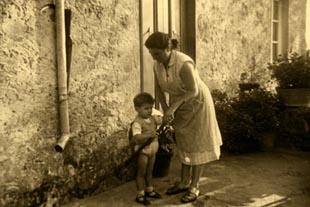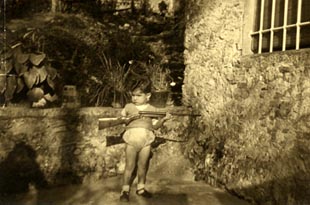THE AUTOBIOGRAPHY OF MARINO MATTEI
HOME •
MUSIC •
DRAWINGS •
PHOTOGRAPHY •
DESIGN & ILLUSTRATION •
EXHIBITIONS •
MISCELLANEOUS •
CONTACT
This is the recounting and the diary of my life - Marino Mattei
21.
I'd like to recount all of the things that happened and the many humiliations and
ugly scenes that I experienced due to Pietrino [see
parts 19
and 20] - all
without justification. Things that I have never been able to forget and that are
unpardonable. It is a great mistake to work for relatives; particularly, in the
circumstances that I was in. With the responsibilities I was assigned, every
reproach made by my relatives was felt more acutely by me. The criticism was
compounded by the fact that I was doing my very best to see that things went
smoothly. As such, receiving unjust reproaches was impossible to forgive.
My work at the Italpresepio [see
parts 19
and 20] was hard but, even more
than this, it was extremely stressful. I left the house at around 6:15. Every
morning I had something to deliver to Libia [his sister-in-law; see parts
19
and 20]. We had hired
Bertolina [as a farm-hand; see part 19]
and we
paid her well. Two or three times a week Marta made Bertolina gather grass to
feed Libia's rabbits and in the mornings I, like a little mule, took it over to her.
Every 15 days in the evening after work, Libia gave me their dirty clothes that I
brought home to Gromignana. Marta and Bertolina washed and ironed the
laundry and as soon as it was ready I, the same little mule, delivered it to
Coreglia [where Libia and Pietrino lived - it is about a mile or two from
Gromignana].

 My mother and I in front of our home
My mother and I in front of our home
in
Gromignana, circa 1957
We began work at 7:00 AM. We had two hours of rest that started at noon. This,
however, was not true in my case. As soon as I left for lunch I went to Libia's
house and she always found work for me to do. Many days it would be time to
go back to the shop and I'd never even had a chance to eat lunch. When I did eat,
Libia prepared the food but it was nothing special because Pietrino left work at
2:00 and they had a proper lunch at 2:30. I was usually given leftovers from the
day before.
I had unwillingly taken the job of factory manager [see
part 20]. I knew
the employees did not want me in that position and I was certain that I would not
be able to get along with Pietrino but in accepting the work I did my very best to
see that it was done as perfectly as possible. However, despite all my efforts I
was unsuccessful because no one listened to me. I had been discredited and the
employees to full advantage of this.
I felt like a beaten man. There was no other choice but to abandon the
Italpresepio. I attempted to talk to Marta many times in order to explain my
situation but she never agreed with my point of view. She always had great trust
in Pietrino and the rest of her relatives. In her eyes it did not matter what was
happening because, where her family was concerned, everything was fine.
Seeing that it was impossible to reason with Marta I studied night and day to
arrive at a solution to my problems. I could no longer stay in my current
situation because sooner or later I would have gone mad. Each morning I left the
house like a wet rag. I opened the factory in a daze. I was depressed and
disgusted and it no longer mattered what happened.
As I said, there was nothing left for me other than to leave the Italpresepio. But
how could I do this? There were very few jobs available and I was no longer
young. At 46 years old it would have been difficult finding work. I spoke to Ida
[his mother-in-law; see parts 19
and 20] and I had her write to Iacopa - her
sister in America - to see if her son would be willing to sponsor me. [At that
time, immigrants needed to be sponsored by an American citizen in order to
enter and work in this country.] In fact, Ida did write to her sister and we
soon received a response from Remo [Iacopa's son] in which he asked me
to send him documentation stating what type of work I specialized in. The
documents needed to be signed by the owner of the company for which I was
employed. I immediately had all the necessary papers drawn up by Emilio, the
clerk at the Italpresepio, and I took them to the municipal office [presumably,
the city hall of Coreglia] for Pietrino to sign [perhaps Pietro held a
position there]. When he saw them he changed his color, saying he had no
intention of signing the documents. I replied, "You can do what you want.
If you won't sign them, I'll find someone who will." At this point, although
still angry, he agreed to sign "because anyway," as he said,
"I'm sure you're not going to leave." On that same day I mailed them
to Remo and in 8 months we departed for America.
As soon as I had mailed the papers to Remo I began thinking about how to
organize all my business in Gromignana. Most importantly; what to do about
Marta and Maurizio? My plan was to go to America alone in order to establish
things for my family. This meant that Marta and Maurizio also had to leave
Gromignana. [Although both Coreglia and Gromignana are small, remote
villages, Gromignana is more so than Coreglia. Additionally, the house and land
in Gromignana would have been very difficult to maintain without him.] I
had thought that Marta could get a little house in Coreglia. Maurizio would go to
school and she could work for a while in a shop in Coreglia. This would only be
temporary until I could send her money for living expenses after having
established myself in America.
Unfortunately however, my plans fell through here as well. Libia insisted that
Marta remain in Gromignana. This was an impossibility because she could not
have managed the property, paid Bertolina every Saturday and all the other
workers that were needed without having steady money coming in. I tried to
convince Marta of this but, as usual, she did not listen. She knew she would not
have been able to handle the property but since Libia was adamant on the subject
Marta did not want to contradict her.
Continue reading >>>
© 2009 by Maurice Mattei
All rights reserved.
HOME •
MUSIC •
DRAWINGS •
PHOTOGRAPHY •
DESIGN & ILLUSTRATION •
EXHIBITIONS •
MISCELLANEOUS •
CONTACT



